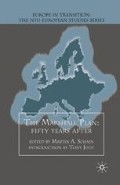Abstract
This article reviews the post-World War II shift of American public opinion away from isolationism. With the high level of public support for the Marshall Plan, and with the perceived success of the Plan and other American policies, the American public has been supportive of foreign aid proposals and policies initiated by its political leaders, despite misperceptions to the contrary. Americans have continued to make clear distinctions between and among different types of foreign assistance and other policies, involving friends and foes alike.
An earlier version of this chapter was presented at “The Marshall Plan: 50 Years Later,” Conference sponsored by the Institute on Western Europe (School of International and Public Affairs, Columbia University), the Center on European Studies (New York University), and The Italian Academy for Advanced Study in America (Columbia University), February 12–14, 1998, New York. I wish to thank the conference organizers. I am also indebted to Benjamin I. Page and Lawrence R. Jacobs for past and current collaborations, and to the Pew Charitable Trusts for support to study presidents, public opinion, and policy making. The responsibility for all analysis and interpretations is the author’s.
Access this chapter
Tax calculation will be finalised at checkout
Purchases are for personal use only
Preview
Unable to display preview. Download preview PDF.
References
Cohen, Bernard C. (1973), The Public’s Impact on Foreign Policy, Boston: Little, Brown.
Delli Carpini, Michael, and Scott Keeter (1996), What Americans Know about Politics and Why It Matters, New Haven: Yale University Press.
Eisinger, Robert (1994), “Presidential Polling in the 1950s and Beyond,” Paper Presented at the Annual Meeting of the American Association of Public Opinion Research.
Foster, H. Schuyler (1983), Activism Replaces Isolationism: U.S. Public Attitudes, 1940–1975, Washington, DC: Foxhall.
Graham, Thomas (1994), “Public Opinion and U.S. Foreign Policy Decision Making,” in D. Deese, ed., The New Politics of American Foreign Policy, New York: St. Martin’s Press.
Hilderbrand, Robert (1981), Power and the People: Executive Management of Public Opinion in Foreign Affairs, 1897—1921, Chapel Hill: The University of North Carolina Press.
Hinckley, Ronald H. (1992), People, Polls, and Policymakers: American Public Opinion and National Security, New York: Lexington Books.
Jacobs, Lawrence R. (1992), “The Recoil Effect: Public Opinion and Policy Making in the United States and Britain.” Comparative Politics, 24: 199–217.
Jacobs, Lawrence R. and Robert Y. Shapiro (1994), “Issues, Candidate Image, and Priming: The Use of Private Polls in Kennedy’s 1960 Presidential Campaign,” American Political Science Review, 88 (September): 527–40.
Jacobs, Lawrence R. and Robert Y. Shapiro (1995), “The Rise of Presidential Polling: The Nixon White House in Historical Pespective,” Public Opinion Quarterly, 59: 163–95.
Jentleson, Bruce (1992), “The Pretty Prudent Public: Post Vietnam American Opinion on the Use of Military Force,” International Studies Quarterly, 36: 49–74.
Kernell, Samuel (1976), “The Truman Doctrine Speech: A Case Study of the Dynamics of Presidential Opinion Leadership,” Social Science History (Fall): 20–44.
Leigh, Michael (1976), Mobilizing Consent: Public Opinion and American Foreign Policy, 1937–1947. Westport, CT: Greenwood.
Mueller, John (1994), Policy and Opinion in the Gulf War, Chicago: University of Chicago Press.
Oneal, John R., Brad Lian, and James H. Joyner, Jr. (1996), “Are the American People ‘Pretty Prudent’? Public Responses to the U.S. Uses of Force, 1950–1988,” International Studies Quarterly, 40: 261–80.
Page, Benjamin I., and Robert Y. Shapiro (1992), The Rational Public: Fifty Years of Trends in Americans’ Policy Preferences, Chicago: University of Chicago Press.
Powlick, Philip J. (1991), “The Attitudinal Bases of Responsiveness to Public Opinion among American Foreign Policy Officials,” Journal of Conflict Resolution, 35: 611–41.
Richman, Alvin (1996), “The Polls—Trends: American Support for International Involvement: General and Specific Components of Post-Cold War Changes,” Public Opinion Quarterly, 60 (Summer): 305–21.
Rielly, John E., ed. (1999), American Public Opinion and U.S. Foreign Policy 1999, Chicago: The Chicago Council on Foreign Relations.
Shapiro, Robert Y. (1998), “Public Opinion, Elites, and Democracy,” Critical Review, 12 (Fall): 501–28.
Shapiro, Robert Y., and Benjamin I. Page, 1988. “Foreign Policy and the Rational Public.” Journal of Conflict Resolution, 32: 212–47.
— (1994), “Foreign Policy and Public,” in Deese, David A., ed., The New Politics of American Foreign Policy, New York: St. Martin’s Press.
Sobel, Richard, ed. (1993), Public Opinion in U.S. Foreign Policy: The Controversy Over Contra Aid, Lanham, MD: Rowman & Littlefield.
— (1996), “U.S. and European Attitudes toward Intervention in the Former Yugoslavia: Mourir pour la Bosnie,” in Richard H. Ullman, ed., The World and Yugoslavia’s Wars, New York: Council on Foreign Relations.
Wittkopf, Eugene R. (1990), Faces of International: Public Opinion and American Foreign Policy, Durham, NC: Duke University Press.
— (1996), “What Americans Really Think About Foreign Policy,” The Washington Quarterly, 19 (3): 91–106.
Yankelovich, Daniel, and I. M. Destler, eds. (1994), Beyond the Beltway: Engaging the Public in U.S. Foreign Policy, New York: Norton.
Zaller, John (1992), The Nature and Origins of Mass Opinion, New York: Cambridge University Press.
— (1998), “Monica Lewinsky’s Contribution to Political Science,” PS: Political Science and Politics, 31 (June): 182–89.
Editor information
Copyright information
© 2001 Martin Schain
About this chapter
Cite this chapter
Shapiro, R. (2001). The Legacy of the Marshall Plan: American Public Support for Foreign Aid. In: Schain, M. (eds) The Marshall Plan: Fifty Years After. Europe in Transition: The NYU European Studies Series. Palgrave Macmillan, New York. https://doi.org/10.1007/978-1-349-62748-6_14
Download citation
DOI: https://doi.org/10.1007/978-1-349-62748-6_14
Publisher Name: Palgrave Macmillan, New York
Print ISBN: 978-1-349-62750-9
Online ISBN: 978-1-349-62748-6
eBook Packages: Palgrave Political & Intern. Studies CollectionPolitical Science and International Studies (R0)

